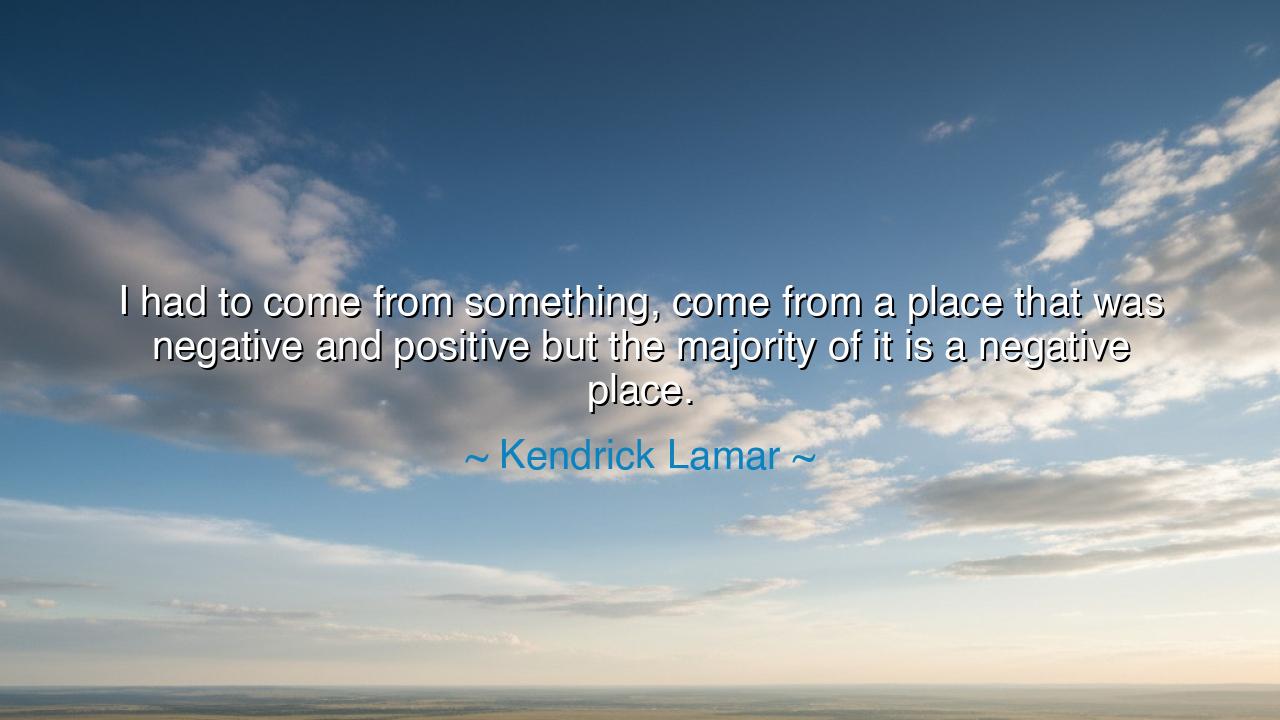
I had to come from something, come from a place that was
I had to come from something, come from a place that was negative and positive but the majority of it is a negative place.






Listen well, children of the future, to the testimony of Kendrick Lamar: “I had to come from something, come from a place that was negative and positive, but the majority of it is a negative place.” These words are not mere confession; they are a mirror of the eternal journey of the human spirit. For every soul is born into a place, a time, a soil that bears both thorns and roses. And it is from such ground—often harsh, often unyielding—that greatness is forged.
The meaning of this saying is layered. To be born into a negative place is to awaken in the midst of hardship, to know struggle before comfort, to meet adversity before triumph. Yet such beginnings are not curses alone—they are crucibles. They carve resilience into the heart, they sharpen vision, and they demand endurance. When Kendrick speaks of both negative and positive, he acknowledges the dual nature of existence: no man’s past is wholly dark, and no man’s past is wholly light. The mixture is what creates strength, yet it is the weight of the negative that often presses the hardest and, paradoxically, teaches the most.
History reveals this truth in the life of Frederick Douglass. Born into slavery, into chains both physical and mental, he knew the depth of the negative place. His beginnings were marked by deprivation, cruelty, and denial of humanity. Yet it was in that same furnace that his unyielding spirit was formed. Douglass seized literacy when it was forbidden, spoke when silence was demanded, and rose from bondage to become one of the greatest voices of freedom. His journey, like Kendrick’s, shows that a negative place can be the soil where vision and destiny are nurtured.
This teaching, however, is not meant to glorify suffering, but to reveal its hidden power. The negative is not good in itself, but it may be used as fuel. Hardship can destroy the careless, but for those who embrace its lessons, it can grant wisdom beyond measure. The positive—moments of love, guidance, or inspiration—are like stars piercing the night sky, reminding the struggler that even in a dark world, light remains to guide him forward.
Let us not forget, though, that the choice lies with the individual. Two children may grow in the same broken street; one may fall into despair, the other may rise into greatness. The difference is not the negative place, but what is made of it. Thus, Kendrick’s words remind us that origin is not destiny, but a foundation—a ground upon which the tower of one’s life is built.
The lesson is clear: if you were born in a negative place, do not despise your beginnings. Honor them as the forge from which you emerged. Carry both the scars and the strengths as part of your story, but never let them chain your future. If you were born in a positive place, do not waste that gift—use it to lift others who still wander in shadow.
Practical actions follow from this wisdom. Reflect each day on where you have come from; write your story, not to lament, but to see how far you have traveled. Transform bitterness into determination, and pain into empathy. Seek mentors, create opportunities, and when you ascend, turn back and extend your hand to another still rising from their negative place. In this way, your journey becomes not only your own salvation but also a beacon for generations yet unborn.
So remember this, O listener: you need not be defined by the negative or even by the positive of your beginnings. What matters is that you came from something, and by the strength of your will, you can shape that something into greatness. Like Kendrick, like Douglass, like all who endured and rose, you too can turn the ashes of hardship into the fire of destiny.






CCCak2020 Con
This quote raises questions about identity and storytelling. How much of Kendrick Lamar’s narrative and artistic voice is shaped by the negative aspects of his upbringing versus the positive ones? Can acknowledging hardship in one’s past be both cathartic and empowering, and how does this influence the messages conveyed through music or other creative outlets? A perspective on leveraging personal history for growth and impact could provide a deeper understanding of turning adversity into opportunity.
BBTrang Be Bo
I’m intrigued by the idea that adversity can act as a catalyst for achievement. Does coming from a largely negative place instill a sense of purpose, drive, or perspective that might be less common in more comfortable environments? Conversely, how can individuals ensure that they don’t internalize negativity in destructive ways? Understanding the complex interplay between environment, personal mindset, and creative expression could reveal why some people excel despite—or because of—difficult circumstances.
TDThai Thi Dung
Reading this, I feel compelled to think about the balance between positive and negative influences. How does one navigate a predominantly negative environment while still holding onto optimism or personal goals? I’m also curious whether the presence of even small positive elements makes a significant difference in shaping values and aspirations. Exploring how people reconcile challenging backgrounds with personal growth could provide insights into resilience and the human capacity to thrive.
1TDuong 12B Thuy
This statement is powerful and makes me reflect on the role of environment in shaping identity. I wonder how growing up in a largely negative place influenced Kendrick Lamar’s artistry, resilience, and perspective on life. Can exposure to adversity actually foster creativity and determination, or does it risk long-term psychological harm? I’d like a perspective on how individuals transform challenging circumstances into motivation and whether support systems can amplify or mitigate these effects.